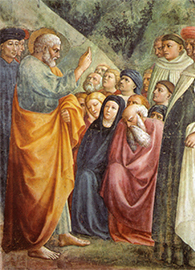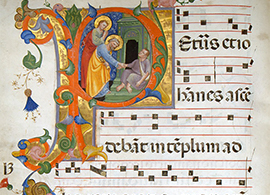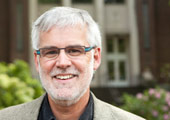Acts Week 3
Settling in Without Settling Down: Acts 3–4
By Jack Levison
W. J. A. Power Professor of Old Testament and Biblical Hebrew, Southern Methodist University
Read this week’s Scripture: Acts 3-4
18:02

 Enlarge
Enlarge
One observer described the most famous American camp meeting, the Cane Ridge Revival of 1801, in this way:
To see those proud young gentlemen and young ladies, dressed in their silks, jewelry, and prunella, from top to toe, take the jerks, would often excite my risibilities. The first jerk or so, you would see their fine bonnets, caps, and combs fly; and so sudden would be the jerking of the head that their long loose hair would crack almost as loud as a wagoner’s whip [Author’s Note 1].
Religious ecstasy can be enthralling. No doubt about it. Or, to put it in terms of last week’s Lectio, a rollercoaster can be a thrill ride. But the ride requires restraints, serious restraints, to keep us from falling out.
Pentecost, the mother of all revivals, had restraint built in: Jesus’ followers spoke not in tongues but in other tongues. And those tongues, those dialects, had clear content: the praiseworthy acts of God. The Galilean farmers and fishermen were not unbridled in their ecstasy; the tomb-visiting women did not have hair that cracked like a wagoner’s whip.
Still, how heady it must have been to find foreign languages flowing from their spirit-filled mouths. How giddy they must have become at the immediate success, as millions of goose bumps erupted when 3,000 bodies were baptized on the spot. How did the apostles respond? What did Jesus’ followers do? They immediately put in place safeguards, communal disciplines, that whisked attention away from the fervor and fever of those exhilarating first days.
In other words, they settled in for the long haul. “They devoted themselves,” Luke tells us, “to the apostles’ teaching and fellowship, to the breaking of bread and the prayers” (Acts 2:42). They studied. They prayed. They ate, probably in imitation of Jesus’ last meal, when he broke bread in the upper room. And they did all of this together in uncommon unity.
To top off this esprit de corps, the community took the tough step of pooling their resources. Remember that many new believers had come to Jerusalem for festivals, including Pentecost, so they were transients; they were homeless. To survive as a community, people sold possessions and pooled them, distributing to people according to their needs.
This was not the first ancient community to pool resources. The community at Qumran, which lay less than 20 miles east of Jerusalem, as the crow flies, and whose writings make up of many of the Dead Sea Scrolls, pooled its resources [Author’s Note 2]. But there is a huge difference.
The people of the Scrolls detested the Jewish temple; the early followers of Jesus “spent much time together in the temple” (Acts 2:46). The people at Qumran rejected other Jewish groups; the followers of Jesus had the “goodwill of all the people. And day by day the Lord added to their number those who were being saved” (2:47). The Qumran folk were out to create an isolated, alternate world; Jesus’ followers were out to change the world. In short, the community settled in for the long haul, but they most certainly did not settle down.
Serious Humor
Add to this stunning esprit de corps something else: “Awe came upon everyone, because many wonders and signs were being done by the apostles” (2:43). While they put demanding communal disciplines in place, the apostles prompted signs and wonders.
The first individual sign happens in the next chapter. Peter and John are bee-bopping their way to the temple, praising God and preparing to pray (Acts 3:1), when they meet a 40-plus-year-old lame man. Because they’ve pooled their resources, what little they had after following Jesus around, they can’t offer him a penny, so they look at him steely-eyed and heal him instead. The man jumps up, walks, leaps, and praises God. It’s a lovely scene, an amazing scene, one that attracts hefty attention.
It’s also a funny scene. The man, apparently still walking and leaping and praising God, clutches Peter and John, and everyone is running — the Greek says running together — to where Peter and John are. As a sort of exclamation point, Luke ends the sentence, in a craggy bit of word order, with “utterly astonished”: “While he clung to Peter and John, all the people ran together to them in the portico called Solomon’s Portico, utterly astonished” (Acts 3:11).
You’d expect here, “the people, utterly astonished, ran together to them in the portico.” Putting “utterly astonished” at the tail end does more than emphasize surprise. The word order is slightly out of whack, off kilter even. This jagged word order reflects the chaotic scene. Such pulsing energy is refreshing. Aeons before a single church building was built or a Christian college conceived, pandemoniacal praise ruled the day — at least this particular day. Clutched by a lame man (who is still vibrating with energy), with an utterly astonished crowd descending on him at a clip, Peter preaches.
The sermon is surprising. It is unemotional, even slightly academic, and certainly anti-climactic. Peter digs deep into the Jewish Bible — the Christian Old Testament — to demonstrate that the Jews have killed their messiah, through whom this man (Exhibit A: bouncing and praising man clutching Peter and John) is healed. Peter also finds grace in the Old Testament: God can forgive their ignorance. Lots of Bible here, very little emotion. Peter does not manipulate; he demonstrates. He doesn’t cajole; he convinces.
Thank God for Short Sermons
The civic and temple leaders in Jerusalem don’t like what they see, so they arrest Peter and John. And levity is displaced by gravity: the dead-serious footfall of powerful sandals. The next day, John and Peter are put on trial, and Peter preaches a surprisingly short sermon, especially for a typically longwinded Peter. We learn a great deal from this little trial scene in Acts 4:5–14, particularly through three words: filled, saved, and boldness. Let’s take a look at these in turn.
Filled. When Peter is filled with the spirit (Acts 4:8), what does he do? He preaches. The centerpiece — and substance — of Peter’s miniscule sermon is Psalm 118:22: “This Jesus is ‘the stone that was rejected by you, the builders; it has become the cornerstone’” (Acts 4:11).
Filled with the spirit, Peter does not babble or bounce or strut or scream. Filled with the spirit, Peter digs into the Old Testament. It’s important to recognize that this psalm did not just pop into Peter’s head in a moment of inspiration. Psalm 118:22 was well known in the early church; in 1 Peter (1 Peter 2:1–10), Psalm 118:22 occurs alongside a list of other biblical texts. Psalm 118:22, then, was not an isolated text that came to Peter in a flash of inspiration. Psalm 118:22 was part and parcel of early church testimonies to Jesus.
The end of this trial scene gives us another clue to how Peter knew this psalm: “Now when they saw the boldness of Peter and John and realized that they were uneducated and ordinary men, they were amazed and recognized them as companions of Jesus” (Acts 4:13).
The hearers realize Peter and company have been Jesus’ companions. How so? Peter refers to exactly the same psalm and verse that Jesus cited in his parable of the wicked tenants. In each synoptic gospel (Mark 12:10–11; Matthew 21:42; Luke 20:17), Jesus quotes Psalm 118:22. How then did the Jewish leaders realize that Peter had been with Jesus? He used the same Scripture in the same way as Jesus — to understand Jesus’ death. In short, Peter learned this psalm and how to interpret it from Jesus [Author’s Note 3].
So here is lesson number one: Don’t think the holy spirit starts acting when your brain quits. You can prepare for an experience of the holy spirit. You can study in anticipation of the holy spirit’s work in your life. You can learn what makes you a powerful witness to the life, death, and resurrection of Jesus. And those things in the book of Acts are texts, sacred texts, the texts of the Old Testament.
Saved. Chapter 2 ends with the mathematics of faith: “And day by day the Lord added to their number those who were being saved” (Acts 2:47). Seems simple enough. Lots of people were accepting Jesus Christ as their Lord and Savior. But is that what salvation means? Not quite.
After quoting from Psalm 118, Peter ends his short sermon, “There is salvation in no one else, for there is no other name under heaven given among mortals by which we must be saved” (4:12). When a noun and verb with the same root occur so closely together — in this case, “salvation” and “saved” — we stand to learn something big. And here it is: in this context, salvation entails physical healing. “There is healing in no one else, for there is no other name under heaven given among mortals by which we must be healed.”
The leaders have nothing to say to refute Peter. Why? Because “they saw the man who had been cured standing beside them” (4:14). Later still, they could not punish them, “[f]or the man on whom this sign of healing had been performed was more than forty years old” (4:22).
This interpretation of salvation may seem like an attack on an evangelical staple of faith. It may be tough to swallow; it was for the leading pastor on Long Island when I was a college student. I was excited one summer to tell him what my Greek teacher had noted, that Peter is talking about salvation-as-healing. The minister, furious with me, spit out, “You have to get out of that college!” A new interpretation of salvation, at least in this context, was more than he could bear. Salvation for him was spiritual; to interpret salvation as healing was to strip it, somehow, of its worth.
Think about it. Is salvation really just spiritual? Even the English word, salvation, has the word salve in it. My mother used Rawleigh Antiseptic Salve on just about every gash we got, any sickness we suffered (like the father in My Big Fat Greek Wedding who sprays Windex on everything.) So I wonder, why limit salvation to the spiritual world?

 Enlarge
Enlarge
Luke himself clearly uses the Greek word to describe physical healing. When messengers bring word that a little girl whom Jesus planned to heal is now dead, he replies, “Do not fear. Only believe, and she will be saved” (Luke 8:50). She will be healed, brought back to life. In the book of Acts, Paul noticed a man who couldn’t walk. “And Paul, looking at him intently and seeing that he had faith to be healed,” spoke to him (Acts 14:8–9). The Greek word translated “healed” in Acts 14:9, describing the man who once sat at the Beautiful Gate of the temple, is the same word translated “saved” in Acts 4:12.
Here, then, is lesson number two: Sometimes we draw lines that don’t belong there — between spiritual and physical, for one. But Jesus didn’t draw that line. Neither did Peter. Salve-ation is a salve that heals the whole of us [Author’s Note 4]. Thank goodness for that.
Boldness. The Jewish leaders are struck, not just by the words of Peter, but also by his “boldness” (Acts 4:13). Later in the chapter, after Peter and John are released from prison, the friends they visit are cowed by the coalition that is lining up against them: Herod and Pontius Pilate, the Romans and the Jews (4:27). So they pray “to speak your word with all boldness” (4:29). “When they had prayed, the place in which they were gathered together was shaken; and they were all filled with the Holy Spirit and spoke the word of God with boldness” (4:31).
“Boldness” here includes courage, and no doubt a hefty measure of audacity. But it means much, much more. For Aristotle and the Greeks, only full citizens of Athens had the right to speak with boldness. Aliens and slaves could not speak freely — with boldness. Later, the word had moral connotations; only those with moral weight, such as philosophers, had the right to speak boldly [Author’s Note 5].
In Acts, those boundaries evaporate, and the boldness of Peter and John, coupled with the spirit-filled boldness of the community, causes pretensions and presumptions to disintegrate. Peter and John? Unlearned, uneducated men, for whom a Roman education was not an option. And the community? Women and men, male and female slaves, old and young. Their prayer — and God’s answer through ground-shaking spirit-filling — takes us back to Pentecost. This praying clump of early believers was the disarming army of Joel:
[Y]our sons and your daughters shall prophesy, and your young men shall see visions, and your old men shall dream dreams. Even upon my slaves, both men and women, in those days I will pour out my Spirit; and they shall prophesy” (Acts 2:17–18, quoting Joel 2:28–29).
Here they all are, an unlikely assortment of panicked prophets, scared half to death but praying for boldness nonetheless.
Lesson number three? You won’t become bold because of birth or breeding. Inspired frankness is not the product of privilege. Some citizens may have been there in that first church. Perhaps even a philosopher or two. But the apostles could hardly be counted among them. Nor could the women. Yet all of them, every last one of them, was filled with the spirit and spoke frankly, boldly. Even salved slaves. [Author’s Note 6]
Questions for Further Reflection
- After the ecstasy of Pentecost, Dr. Levison notes that the believers “settled in for the long haul.” Re-read 2:42–47 and 4:32–37. Why were these practices necessary? Which of these practices come most naturally to you and your church? Which might be a bigger stretch?
- Put yourself in the shoes of those who witnessed the healing and subsequent sermon in Chapter 4. What might you have been thinking or feeling if you were the man who was healed? A new believer? A skeptic? One of the chief priests or elders?
- Dr. Levison draws out three lessons from the trial scene in 4:5–14. Pick one lesson that you’d like to reflect on more deeply in the coming days. What might it look like to embrace one of these lessons more fully in your life? If you feel comfortable, share with a friend about what you plan to do.
<<Previous Lectio Back to Acts Next Lectio>>

This work is licensed under a Creative Commons License.




